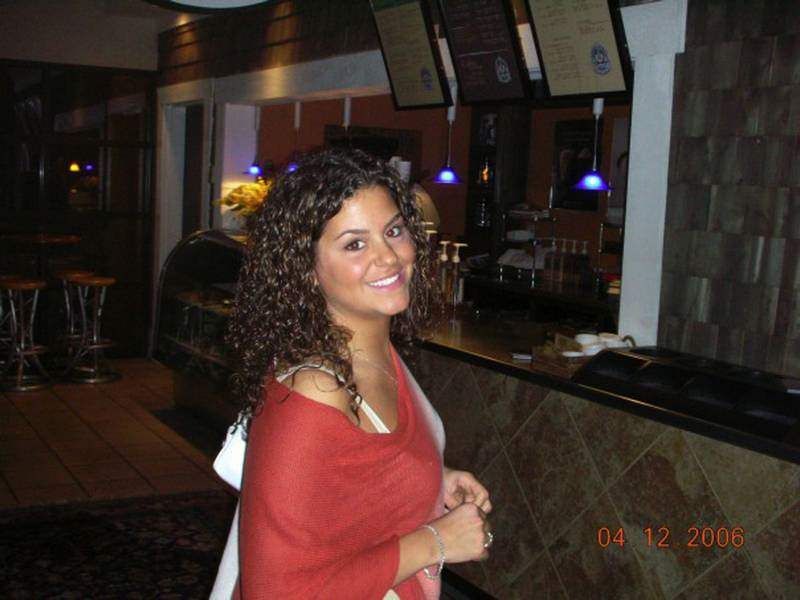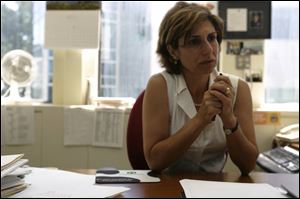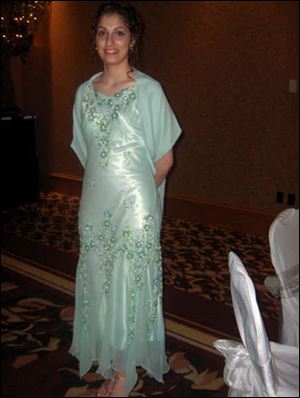
UT professor flees from fighting in Lebanon
7/20/2006
Haddad

Sonia Najjar discusses her escape from Lebanon, which involved $1,600 worth of cross-country taxi rides and a friend's aid.
Beirut appeared reborn from the airplane window, an oasis of hope risen from the ashes of a civil war that Sonia Najjar escaped three decades earlier.
Ms. Najjar, a University of Toledo professor of pharmacology, expected to peck away at her laptop during the flight to Lebanon from Jordan two weeks ago. Her seat mate interrupted her.
"In the Arabic world, this is an embarrassment to me if I'm sitting next to you and you work instead of talking to me," Ms. Najjar recalled Imad Shami, a Jordanian pharmacist, telling her.
They traded telephone numbers, a sudden friendship that allowed Ms. Najjar to later flee Lebanon in taxi rides costing $1,600. Israeli rockets sent in retaliation for the abduction of two of that nation's soldiers by the Shiite paramilitary group Hezbollah had destroyed the airport late last week.

Haddad
The United States has since begun evacuations of American citizens, but several Toledo-area residents are trapped in Lebanon as the fighting intensifies. Stuck near the Syrian border in the village of Ghazze with his parents, Maumee Valley Country Day School senior Omar Smiley e-mailed his classmate Alexis Holman. Bombs woke him yesterday morning.
"The airstrike killed a man who we knew very well and who had just invited my uncle to come play cards last week," the youth wrote. "There was also a second missile that hit a goat farm next by killing 300 goats."
After the missiles exploded, relatives, including young Smiley's mother, made plans to leave the country immediately. But the student wants to stay a bit longer. The family has plane tickets to return on July 28.
"I came here to enjoy a vacation and if the vacation includes a war, then so be it," he wrote. "Plus, going to Jounieh, where the American evacuation is occurring, is impossible because of the bombed roads."

Jarouche
At least four UT students remain in Lebanon, said Imad Hariri, president of the university's Arab Student Union.
Mr. Hariri tries to speak with Rita Haddad, a junior biology major at UT, on a daily basis.
Food supplies are low. Power outages are common. Water runs occasionally. And yesterday, a missile hit Ashrafieh, the upscale neighborhood in Beirut where Ms. Haddad is. Mr. Hariri could not reach her by phone afterward.
"She's trying to hold through," said Mr. Hariri, recounting his last conversation with Ms. Haddad. "She's spending all the day at home, not knowing what to do."
Eman Jarouche, a junior pre-physical therapy major; Jihan Younes, a senior communications major, and Jihad El-Kareh, a graduate student, also are in Lebanon.
College students likely will be the last of the evacuees, Ms. Najjar said. Young children and their parents are the first priority.
Ms. Najjar left her family home in Fih, a northern hilltop village overlooking the Mediterranean Sea, about 1 a.m. Sunday.
A local driver took Ms. Najjar, her brother, her niece, and her brother's nanny to Syria in a Mercedes-Benz, a mountainous back-road trip that took four hours and cost $1,200 cash.
"The poor guy had made three trips that day," Ms. Najjar, 46, said yesterday.
"I was very worried he would kill us because he'd fall asleep. I'm impressed that he did not."
Her American passport drew scrutiny from Syria's border guards, who asked Ms. Najjar to prove she wasn't an Israeli secret agent. Ms. Najjar has visited Israel once, a fact she declined to share.
The guards eventually were reassured of Ms. Najjar's identity by the Lebanese passport of her brother, an American citizen who works in Saudi Arabia.
Once in Damascus, the capital of Syria, Ms. Najjar rested briefly at the Sheraton Hotel.
She drank coffee and waited for the $400 Jordanian taxi cab arranged by Mr. Shami, her seat mate on the plane.
Mr. Shami called her after the attacks started. He volunteered his house in Jordan to Ms. Najjar, who stayed there until her return flight to Detroit on Tuesday, a gift she considers to be a blessing from God.
Ms. Najjar's parents, a brother, and seven nieces and nephews stayed in Lebanon.
She first left her parents in Lebanon for San Francisco almost 30 years before, finding safety from the gunfire and explosions that transformed Beirut into rubble.
Back in America, Ms. Najjar is certain of her friendships, her good fortune, and her family's love. But global politics is now a mystery.
"I still don't understand why Lebanon has to be taken as hostage," she said.
Contact Joshua Boak at:
jboak@theblade.com
or 419-724-6728.